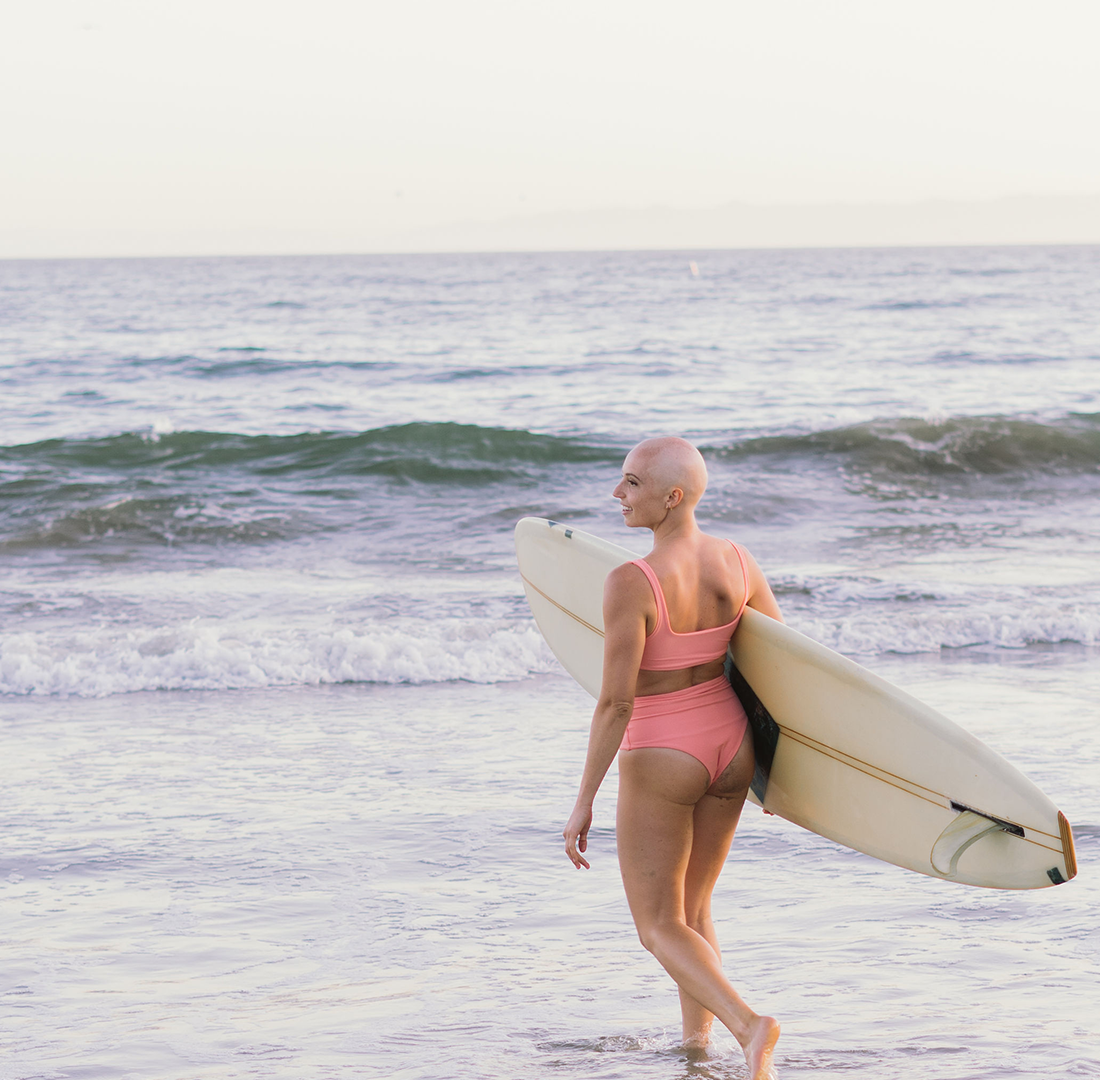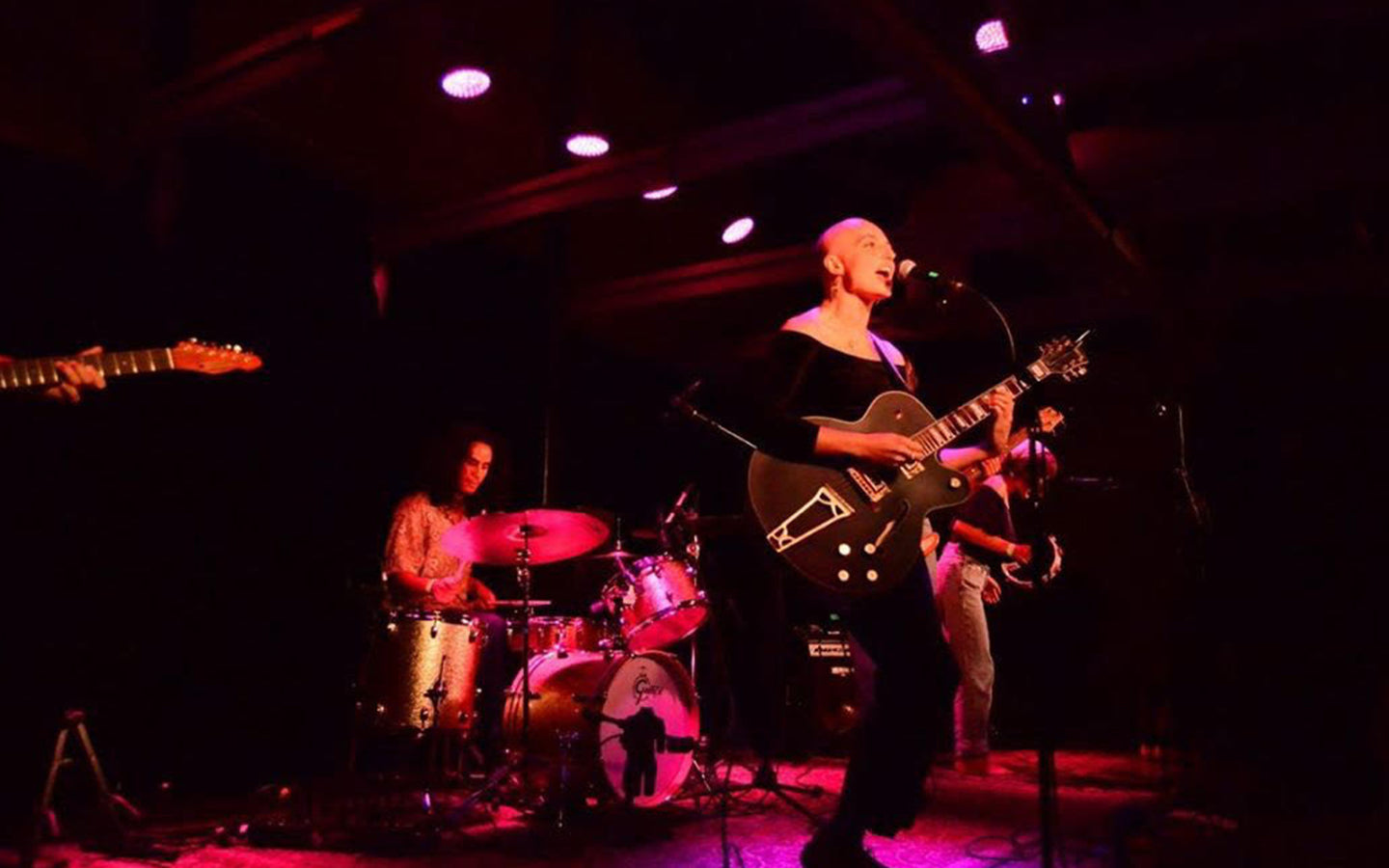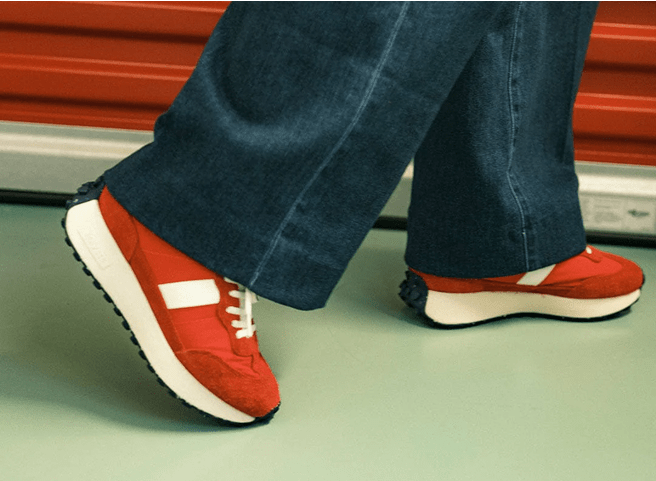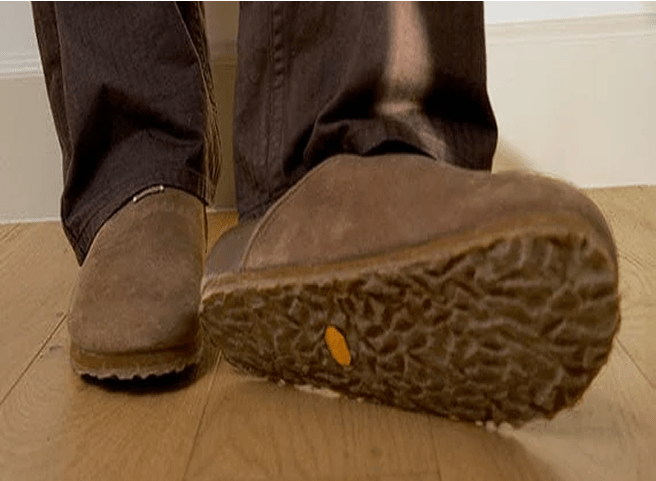Breast Cancer Awareness Month: Maddy's Story


News | October 2020
Breast Cancer Awareness Month: Maddy's Story
This month, our community takeover features Maddy. Maddy is a local artist and surfer, and leads the Santa Barbara-based band Queentide. She joins us this month to share her story after being diagnosed with Stage II Triple Negative Breast Cancer, last year.
More From Maddy Below:
I was headed to a concert in LA the day I had my breast lump biopsied. I was days away from my 25th birthday, and a week away from another surf trip to Sri Lanka, where I had lived for a year prior. I had just formed a new band, Queentide. We had shows planned throughout the summer, and I was working remotely as a science writer for an environmental research institute. I had a badass vegetable garden, a sweet yoga work-trade deal and a cute little house that I lived in with 4 other girls. I was fully prepared to continue being young, careless and invincible.
Over the weekend I forgot about the biopsy. It wasn’t until late Monday night that I listened to my voicemails: “Madeline, this is Kimberley from Planned Parenthood. We have your biopsy results and we’ve been trying to get ahold of you. It’s not good.” The next day, the news: Invasive Ductal Carcinoma--breast cancer.
Shock was an understatement. I felt like I’d had the wind knocked out of me. At the time, like most young people, I didn’t know anything about breast cancer. Now, as we come to the end of Breast Cancer Awareness Month and after a year and a half of fighting this disease, I’m here to tell you a little bit about what I’ve learned over the last year that I think everyone should know.

My Diagnosis (AKA What is TNBC?):
My diagnosis was Stage II Triple Negative Breast Cancer (aka TNBC). ER-, PR-, Her2-: Sounds very science-y so I’ll try to break it down. Most breast cancers are caused by an extreme hormone imbalance of estrogen, progesterone, and Her2, which is also why most breast cancers occur after menopause.
However for TNBC, scientists are only able to say that they know it’s not caused by those 3 hormones (hence the term “triple negative”). It’s more rare. It accounts for around 15% of breast cancer diagnoses.
Additionally, it's mostly found in younger women and women of color and it is often more aggressive. We have limited treatment options and a poorer prognosis because it is harder to isolate the cause.
Breaking Down the Different Stages:
Stage I means the tumor is “encapsulated” in the milk duct, where it started. Stage II means it has invaded the tissue immediately around the milk ducts, and is larger than 2cm. Stage III means the cancer has metastasized: it has spread to the lymph nodes, and can travel through the body. Stage IV means the cancer has metastasized and grown on distant organs and bones in the body.
Understanding Genetics:
If someone in your family has had breast cancer, it is worth getting screened for the following genetic mutations: BRCA1, BRCA2. “Previvors” are women that know their risk of breast cancer, and take proactive measures to prevent development of disease.
While genetics do an incredible job of predicting risk, you can still get breast cancer without it. With zero genetic indicators of hereditary cancer risk, I will never know why I got cancer. I can only guess that, if not hormones or genetics, it had to have been some sort of environmental/toxic exposure or dietary link. I have trouble believing I'm “the chosen one,” or just “plain unlucky” as my doctors like to say.
 |
 |
The Journey:
Below are the various types of treatment I received to combat the cancer:
Infusion Chemo: The chemo for breast cancer is delivered in an IV, and it basically is a systemic poison that kills most of the fast-growing cells in the body. This is why people going through chemo lose their hair and have issues with fertility, etc. It is so hazardous that the nurses delivering it wear PPE when administering it. I went through this for about 20 weeks. Felt like crap some days, surfed and played shows at SOhO others.
Mastectomy: A major surgery that removes all breast tissue under the skin. In the same surgery, a plastic surgeon can start the “breast reconstruction” process by placing expanders (basically empty balloons) where the breasts were so that, as your skin heals from the incisions, it can also make space for future silicone implants. No surfing for ~2 months!
Immunotherapy: Cancers fool the body into thinking they are normal, healthy cells. Immunotherapy, also given in an IV, essentially retrains the immune system to recognize cancer cells as a deadly threat, and fights them. I had no side effects from this treatment, too!
Radiation: Toxic, high energy light beams pointed at the cancer location that can kill cancer cells. I had 36 rounds of radiation, every day except weekends for about 2 months. It looks/feels like a very bad sunburn. Eventually it broke my skin and I was once again barred from surfing for another month.
Reconstruction: In June, I had another surgery to swap out my temporary expanders for my semi-permanent silicone implants that should last ~11 yrs. While many people think this is the “free boob job” part of the process, they don’t realize that implants, without any other natural breast fat to cushion/smooth out the edges, are not very comfortable, have major scarring and do not look like a classic boob job. Some women also choose to get flat reconstruction. No surfing for ~8 weeks after this one too!
The Recovery:
By many means, it could have been a really bad year, but myself and my community fought really hard to make it a good one.
Some days were drenched in this unwavering determination to appreciate the beautiful little lessons snuggled in the bummer bundle I had been handed. Some days I get bogged down about missing out on my 20s and being trapped in a treatment schedule that my life low-key depended on. Yet, in this year, I hugged a lot longer and deeper, and I think I said I love you and truly meant it more times than ever.
I didn’t miss many opportunities to get in the ocean, and sure as hell didn’t let chemo nausea get in the way of many Queentide shows and recording sessions. We released Sticky Salty, our first EP, and played our first ever sold-out show just weeks after my mastectomy. My understanding of love deepened with every word and gesture from those determined to show in their own language that they are here to help me walk through this storm.

Where do you stand today?
I was able to complete all of this treatment within a little over a year, and it was an emotional, hard-fought battle. However, this journey is a little different for everyone, and if there’s one thing I want you to learn from my journey, it’s this: early detection matters.
I knew my lump was there for about a month, maybe more, before having it checked. It grew in that time. If I had gotten the lump examined sooner, even a month sooner, I could have skipped radiation, the mastectomy and maybe even chemo. Do not skip out on your breast exams, and do not wait to get something checked out if you feel it.



